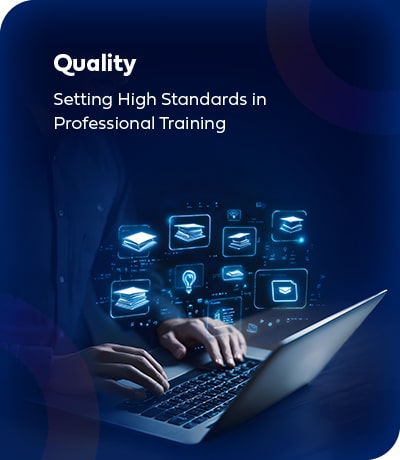
4.8 out of 5 based on 14,693 reviews

Online Course
Start learning immediately
2,330 Students enrolled
Price Match
Guarantee

3 months instalments of: £55.00

By submitting this form, you agree to e-Careers processing your data in line with our Privacy Policy
If you are already working towards becoming a Mortgage Advisor, have completed your CeMAP Module 1 training, and are now looking for a flexible study approach to mastering industry practices in the mortgage market, this CeMAP Module 2 & 3 training course is the key to completing your mortgage certification!
Our online CeMAP 2 & 3 course equips you with the essential principles and skills to become an expert in mortgage products within the financial services environment.
Our CeMAP Modules 2 training course provides the next level of knowledge and skills required to pass your CeMAP exams, including the mortgage products available, application, lending criteria, protection policies, payments, and post-completion issues. Module 3 will assess your understanding of the previous modules and how you apply them in real-life scenarios. Completing these courses will help you gain the expertise and regulatory principles for providing client-centred mortgage advice.
Approved by the FCA and awarded by the London Institute of Banking & Finance (LIBF), CeMAP is a widely recognised qualification in the UK. After completing all modules and passing the CeMAP exams, you'll receive your CeMAP qualification, which will be your license to practice your profession in the mortgage advice industry. Please note you will also need to apply for Competent Adviser Status (CAS) to become a licenced Mortgage Advisor.
CeMAP positions you in a great position to apply for various roles within the financial services industry, such as Mortgage Adviser, Mortgage Underwriter, Mortgage Administrator, Mortgage Compliance Officer, Mortgage Sales Manager and more.
If you prefer a more interactive learning experience similar to classroom training, we also offer a CeMAP Virtual Classroom training session you can enrol in as an alternative to our online CeMAP training course.
Our CeMAP Module 2 & 3 online course offers you the following:
Online learning with 6 months of course access to our industry-leading eLearning platform.
CeMAP-approved training course materials.
Support from award-winning, industry-expert tutors.
A collection of digital resources.
Interactive course content.
Interest-free payment options.
Best price guaranteed on like-for-like courses.
Support from an organisation that has trained over 630,000 students.
Module 2 of your CeMAP journey focuses on understanding mortgage products in the finance service industry.
The CeMAP 2 course comprises four units:
Unit 3: Mortgage Law, Policy Practice and Markets (MLPP)
Unit 4: Mortgage Applications (MAPP)
Unit 5: Mortgage-Related Protection Products (MRPP)
Unit 6: Mortgage Payments Methods and Post-Completion Issues (MPMC)
Meanwhile, CeMAP Module 3 focuses on applying the knowledge gained from the previous two modules in real-life scenarios. This module only consists of one unit: Assessment of Mortgage Advice Knowledge (ASSM). Our course provides comprehensive support to help you take all five units and pass your exams.
Unit 3: Mortgage Law, Policy Practice and Markets (MLPP)
CeMAP 2's Unit 3 provides an overview of the mortgage laws and policies within the UK financial regulation. You'll also learn the legislations and policy practices that go into mortgage lending and integrate economic context in giving mortgage advice.
Some of the expected learning outcomes for this unit are:
Understand the regulatory definition of different types of mortgage and regulated mortgage contracts.
Understand the house-buying process, the key parties involved and their roles.
Understand the process and implications of buying property at auction.
Understand the common types of borrowers, how their main mortgage-related requirements may differ, and what factors may disqualify people from borrowing.
Understand the main requirements of the MCOB rules and the legislation affecting mortgages.
Understand the economic and regulatory context for giving mortgage advice.
Unit 4: Mortgage Applications (MAPP)
Unit 4 delves further into the role of Mortgage Advisers in processing mortgage applications. In this unit, you'll learn the methods of property valuation and the factors that affect its value. You'll also learn about mortgage fees, including arrangement and valuation fees, and the different types of additional security lenders may require, such as guarantors or second charges.
Some of the expected learning outcomes for this unit are:
Understand the role of a Mortgage Adviser and the principles of providing advice to deliver a fair outcome for the customer.
Understand the use of additional forms of security.
Understand the fees involved in arranging a mortgage.
Understand the principal types of property defects that surveys can identify and understand their implications when seeking a mortgage, including the options available to consumers and lenders.
Understand the principal factors affecting the value of property.
Understand the different forms of valuation and survey and which might be appropriate for various properties and/or the borrower's circumstances.
Unit 5: Mortgage-Related Protection Products (MRPP)
Unit 5 of CeMAP 2 introduces you to the financial protection products available when involving mortgages. From insurance products to protection policies, you'll understand the features of these financial products and advise clients on their suitability based on their circumstances.
Some of the expected learning outcomes for this unit are:
Understand the need for financial protection planning.
Identify the main sources of financial protection.
Identify the regulation of insurance products and how it provides consumer protection.
Understand the main features of life assurance protection policies and options to meet consumers' financial protection needs.
Understand the range and application of income protection to meet consumers' financial protection needs.
Understand the different forms of valuation and survey and which might be appropriate for various properties and/or the borrower's circumstances.
Understand the main features of insurance-based mortgage protection policies.
Understand the needs and priorities in selecting appropriate financial protection solutions.
Unit 6: Mortgage Payments Methods and Post-Completion Issues (MPMC)
CeMAP Unit 6 focuses on procedures after completing the mortgage payments and the possible issues arising. You'll also learn about the Mortgage Advisor's role in resolving mortgage concerns.
Some of the expected learning outcomes for this unit are:
Understand the principles, procedures and considerations associated with raising additional money.
Understand the principles, procedures and costs of transferring and amending mortgages.
Understand the implications of consolidating debt appropriately within a mortgage.
Understand the implications of the non-payment of mortgages and other breaches of the Mortgage Deed.
Understand the legal rights and remedies available to lenders regarding non-payment from borrowers.
Understand the structure and features of different types of mortgages.
Unit 7: Assessment of Mortgage Advice Knowledge (ASSM)
Unit 7 of CeMAP 3 assesses your understanding of the fundamental principles in the UK financial services industry. In this unit, you'll learn how to apply the UK financial services regulation and the various mortgage principles and concepts to real-life scenarios and case studies.
Some of the expected learning outcomes for this unit are:
Analyse the key features of different mortgage solutions and their suitability for different customer's circumstances.
Analyse the key features of different forms of property purchase and specialist mortgage lending and their suitability for various customer's circumstances.
Apply the rules and regulations governing mortgage lending, mortgage advice and the sale of associated mortgage protection arrangements.
Apply the principles of ethical and sustainable advice to suit customers' circumstances.
CeMAP 2 & 3 Exams
CeMAP Module 2 has an objective test in a 100-item multiple-choice format. Here's a breakdown of the multiple-choice questions for each unit:
Unit 3: Mortgage Law, Policy Practice and Markets (MLPP) - 25 questions.
Unit 4: Mortgage Applications (MAPP) - 25 questions.
Unit 5: Mortgage-Related Protection Products (MRPP) - 20 questions.
Unit 6: Mortgage Payments Methods and Post-Completion Issues (MPMC) - 30 questions.
The Module 3 exam will contain six case studies, each with 10 linked multiple-choice questions. These exams cover the units and course materials learned through the module, which you must pass before achieving your CeMAP designation.
All exams from both modules are available via the awarding body. These exams can be taken in the comforts of your home via remote invigilation or at one of the 150 Pearson VUE centres across the country. We'll provide you with all the support and resources you need to prepare for your exams. (See Additional Benefits tab)
If you sit at a test venue, you must book your preferred examination date and pay your fees. Exam fees may vary depending on location, so always shop for a venue that offers competitive rates.
Duration
2 hours for each module.
Our CeMAP Modules 2 & 3 training course is ideal for those seeking a career in the financial services industry in a role such as a Mortgage Advisor. You can enrol in the course if you have completed Module 1 of the CeMAP qualification.
To study the Certificate in Mortgage Advice and Practice Module 2 & 3, we recommend that you:
Are currently undertaking the CeMAP qualification.
Complete the CeMAP Module 1.
Are at least 16 years old (or have the consent of a parent or guardian).
Have a solid understanding of the English language.
Have basic numerical skills.
Have access to a PC or laptop (This course is compatible with both Mac and Windows).
Have access to a secure internet connection.
Here are the benefits that you can get from our CeMAP training courses:
Enhanced Professional Recognition: Achieve the Level 3 Certificate in Mortgage Advice and Practice qualification after completing all three modules, which will help show your commitment to professional development in the field.
High Exam Pass Rates: We are one of the UK's leading providers of CeMAP training, with an average pass success rate of 93%.
Comprehensive eLearning platform: Access an industry-leading platform with all the support and learning materials you need and a user-friendly interface for easy navigation.
Responsive Tutor support: Request unlimited support and gain webinar invitations from award-winning tutors and industry experts who aim to assist you with your learning and respond within 24-48 hours.
Interactive course content: Our interactive course content includes engaging slides, videos, and animations you can access on our eLearning platform.
Flexible learning: Study independently, with 6 months of course access, which can be used when and where it suits you best.
Interest-free payment options: Our interest-free payment options make your education more accessible so you can study the course and start your learning journey without worries.
TOTUM Pro Card: Shop with discounts using TOTUM Pro Card, which offers discounts in selected stores and websites.
What does a Mortgage Advisor do?
A Mortgage Advisor, also known as a Mortgage Broker, is a financial professional who helps you navigate the process of securing a mortgage.
Some of the key responsibilities include:
Helping clients assess their financial situation.
Suggest the most suitable mortgage for their needs.
Searching the market to find deals that match their criteria.
Negotiating with lenders.
Guiding clients through the mortgage process.
Pre-qualification and application assistance.
Is it worth becoming a Mortgage Advisor in the UK?
Becoming a Mortgage Advisor is a great option for you in the UK, as it will enable you to meet new people, build relationships, and help them solve their financial concerns. This career choice is rewarding, and Mortgage Advisors who have completed the CeMAP training course and hold CeMAP certifications can typically earn a starting salary of around £40,000, increasing to £75,000+ with experience and a healthy commission package.
Is it worth doing CeMAP?
The Certificate in Mortgage Advice and Practice is worth studying because of the essential skills you'll gain from the qualification. You'll also gain professional recognition that boosts your employability and opens various job opportunities within the industry. You cannot become a Mortgage Advisor without first obtaining your CeMAP qualifications.
Is the CeMAP course valid in Scotland?
CeMAP is a widely recognised mortgage qualification that can be studied and practised in England, Wales and Scotland. While this course is based on the England and Wales syllabus, the Scottish regulatory framework for mortgage law is closely aligned with the English framework.
Therefore, you can complete this CeMAP course and apply for a Scottish Mortgage Adviser's license without retaking any modules.
To ensure that you meet the requirements for practising as a professional Mortgage Adviser in Scotland, you should inform the London Institute of Banking & Finance (LIBF) that you are a Scottish student when you register for the CeMAP course.
The LIBF will then ensure you receive the correct course materials and guide you through applying for a Scottish Mortgage Adviser's license.
What is CeMAP equivalent to?
Gaining the CeMAP qualification is equivalent to A-Levels or Level 3 qualifications or equivalent. Earning the qualification means demonstrating in-depth knowledge, skills, and commitment to Mortgage Advice.
How to prepare for CeMAP?
The first thing you need to prepare for CeMAP is to understand the programme and familiarise yourself with the three modules of the programme and the units covered in each. Then, you should create a realistic study schedule that allocates sufficient time for each module.
Break down the syllabus into smaller, manageable chunks and prioritise topics based on their weight in the exam. Take notes, highlight key points, and actively engage with the content. It would also help to pay close attention to the Financial Conduct Authority's (FCA) guidelines and ensure your study materials cover the relevant regulations.
Finally, various resources are available to help you prepare, including online courses, revision guides, and practice exams. e-Careers will provide you with all the support and resources you need to prepare for your exams.
How long does it take to complete this CeMAP module?
The course completion for CeMAP Modules 2 & 3 depends on various factors, such as the preferred learning style, prior knowledge in the industry, and the amount of time you can dedicate to studying each week. We offer flexibility on the course to allow our students to study at their own pace.
On average, our students typically complete their CeMAP Module 2 & 3 course package within 6 months.
What happens after CeMAP?
Upon completing Modules 1, 2, & 3 of CeMAP, you'll be awarded the certification by the LIBF, which will be your license to practice your profession in the financial services industry. You can also take the Certificate in Regulated Equity Release qualification, which you can use to specialise in providing advice in equity release.
What jobs can I get with my CeMAP qualification?
Once you have completed the full courses and necessary exams, you can start your own mortgage brokerage business or apply for jobs in the finance sector. Some of the common job roles that may require a certificate in mortgage advice include:
Qualified Mortgage Adviser
Qualified Mortgage Advisers evaluate clients' financial situations, recommend suitable mortgage products, and guide them through the application process. The entry-level salary for a Mortgage Adviser is £40,000 but can go as high as £75,000, and be entitled to commissions for experienced professionals.
Mortgage Underwriter
Mortgage Underwriters analyse loan applications, evaluate risks, and determine if applicants meet mortgage approval requirements. The average salary for a Mortgage Underwriter is £30,000.
Mortgage Administrator
Mortgage Administration roles involve supporting the mortgage process by completing paperwork accurately, establishing mortgage payment methods, and coordinating with clients and lenders. The average salary for this position is £24,000.
Mortgage Sales Manager
A Mortgage Sales Manager or Mortgage Relationship Manager is responsible for developing and maintaining relationships with clients, Mortgage Brokers, and other stakeholders. The annual salary for Mortgage Sales Managers is £56,000.
Mortgage Compliance Officer
Mortgage Compliance Officers ensure that mortgage-related activities within an organisation comply with regulations and industry standards. Their annual salary is £35,000.







